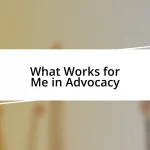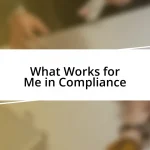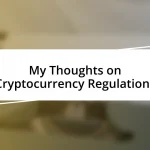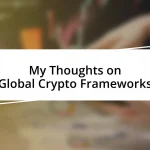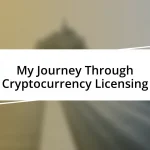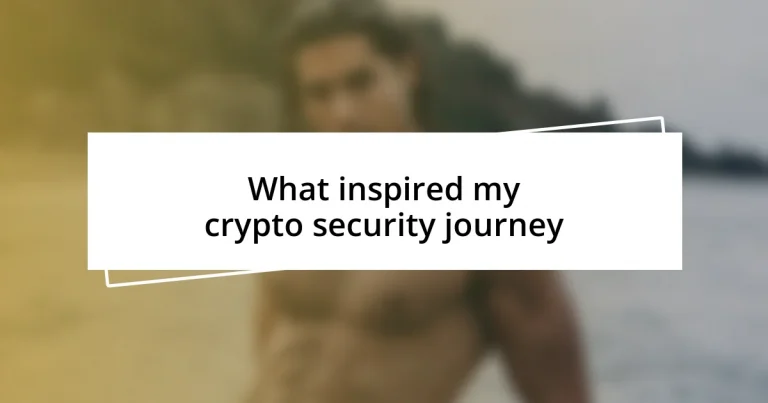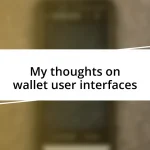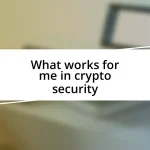Key takeaways:
- Recognizing personal vulnerabilities, including emotional biases and information overload, is crucial for effective crypto security management.
- Engaging with educational resources and learning from industry experts enhances knowledge and security practices in the crypto space.
- Community engagement fosters a supportive environment where individuals can share experiences, learn from each other, and cultivate a proactive security mindset.
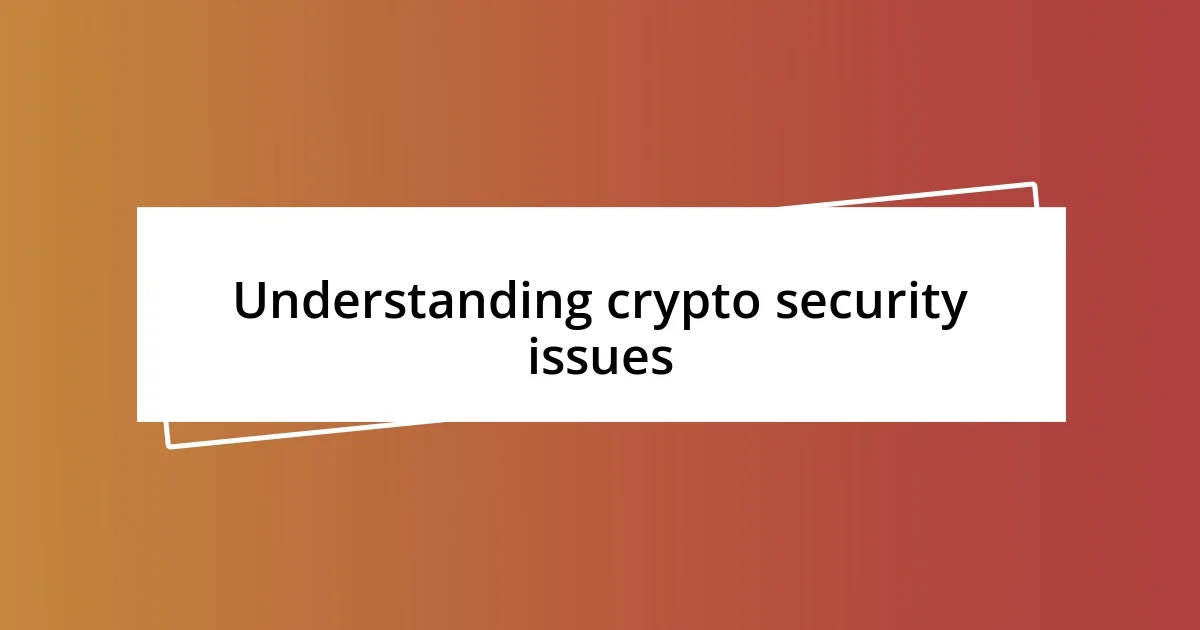
Understanding crypto security issues
When I first ventured into the world of cryptocurrency, the idea of security felt overwhelming. I remember feeling a knot in my stomach when I read about high-profile hacks. How could something so revolutionary be riddled with vulnerabilities? This contradiction fueled my quest to understand the nuances of crypto security.
One of the most shocking revelations for me was realizing that many breaches stem from user error, such as weak passwords or falling for phishing scams. It made me rethink my habits—how often do we carelessly click on links or reuse passwords? I found that adopting a security-first mindset was vital for safeguarding my digital assets against potential threats.
As I delved deeper, I learned about the importance of secure wallets. Let me tell you, the difference between a hot wallet (connected to the internet) and a cold wallet (offline) is like night and day. I made the mistake of keeping too much in a hot wallet at one point, and that led to some sleepless nights worrying about hacks. Reflecting on these experiences has solidified my understanding of the essential steps required to protect myself in this dynamic landscape.
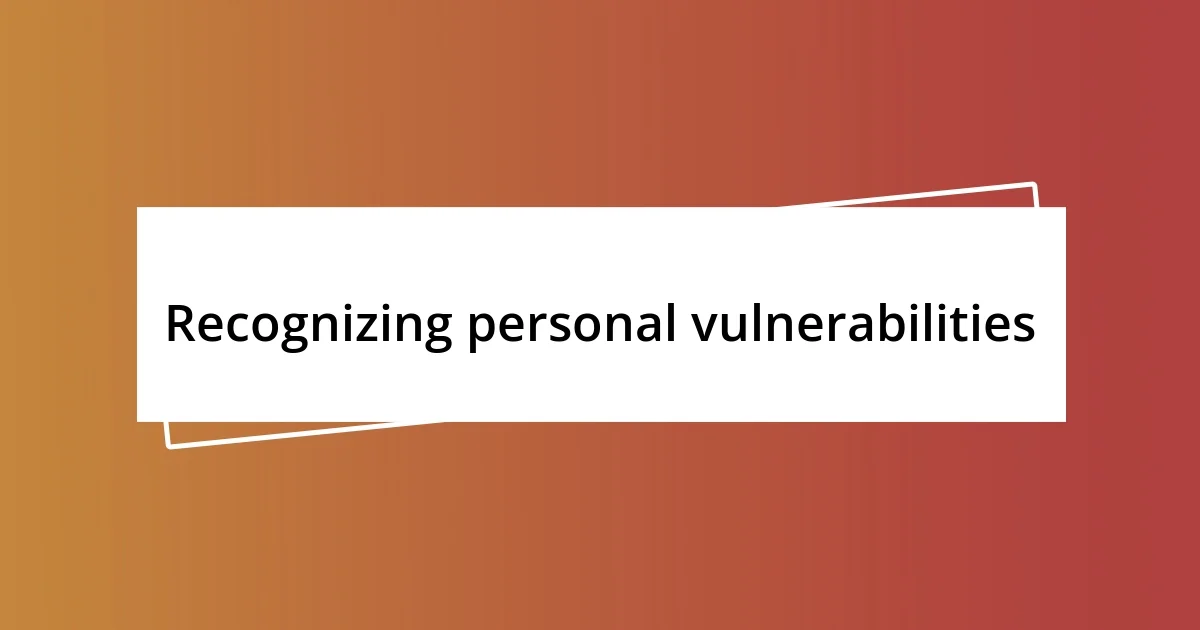
Recognizing personal vulnerabilities
Recognizing personal vulnerabilities is a crucial step in enhancing crypto security. I vividly recall an incident where I thought my two-factor authentication was enough to shield me from potential threats. One day, my phone slipped out of my hand, and I felt the panic rise within me. It suddenly dawned on me that if someone managed to access my device, they could easily compromise my accounts. This experience illuminated how vulnerable I could be, highlighting the need for comprehensive security measures beyond just two-factor authentication.
In my journey, I discovered that emotional attachment to investments can cloud judgment. I remember feeling an intense connection to a particular coin I had heavily invested in. I resisted selling, even when I knew I should, simply because I didn’t want to face the loss. This emotional bias can make us ignore security threats or avoid making necessary changes to our security strategies. Recognizing these emotional vulnerabilities has been essential for me in making rational, rather than impulsive, security decisions.
My reflections have often returned to the idea of information overload. I found myself diving into countless articles and forums, each claiming to have the ultimate solution for security. This abundance of information often made me feel paralyzed rather than informed. I learned the hard way that focusing on the basics could often safeguard my assets far better than trying to implement the latest trend. By cutting through the noise and sticking to fundamental practices, I developed a clearer path to security.
| Type of Vulnerability | Personal Example |
|---|---|
| Device Security | Felt panic after dropping my phone, realizing I could lose access. |
| Emotional Bias | I hesitated to sell a coin due to emotional attachment, risking my security. |
| Information Overload | I struggled to filter through advice, paralyzing my ability to act decisively. |
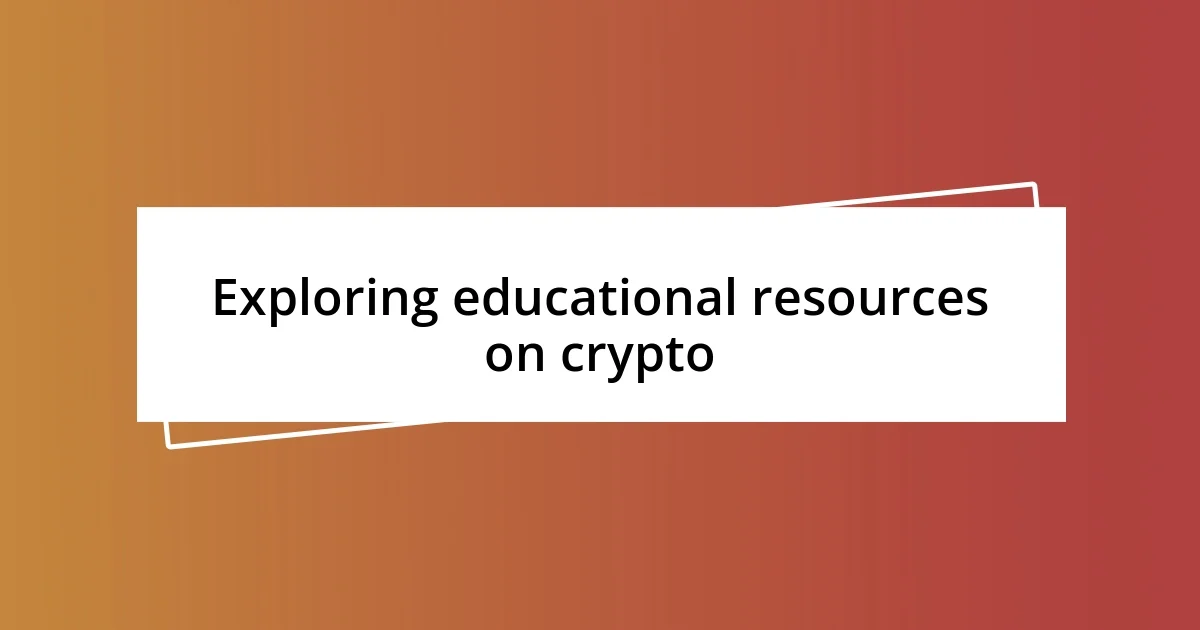
Exploring educational resources on crypto

Exploring educational resources on crypto
Diving into the education side of crypto was like opening a treasure chest of knowledge. I remember spending hours poring over online courses and podcasts, each offering unique perspectives on security best practices. It was enlightening to discover platforms like Coursera and Udemy, which provide structured pathways to understanding cryptocurrency and its associated risks. Not only do these resources make the complex world of crypto more approachable, but they also empower users to make informed decisions that could safeguard their investments.
Here are some valuable resources that I found particularly helpful in my exploration:
- Crypto 101 Podcasts: These bite-sized episodes delivered insights while allowing me to multitask.
- Online Courses: Structured classes on platforms like Udemy helped me grasp the fundamentals of crypto security.
- YouTube Tutorials: Channels dedicated to crypto security provided visual explanations that brought concepts to life.
- Trusted Blogs: I leaned on reputable crypto blogs—these became my go-to for up-to-date security news and strategies.
As I navigated this journey, learning about the diversity of resources available helped me connect with the community. There was something comforting about joining online forums where I could share experiences and ask questions without feeling like a novice. I vividly recall an enlightening discussion on a Reddit thread regarding hardware wallets; it felt like a group of friends trading stories rather than just strangers in a digital space. This sense of camaraderie not only enhanced my learning but reinforced the idea that support is essential. Crypto education is not a solitary endeavor; it’s about building relationships that strengthen our understanding and security.
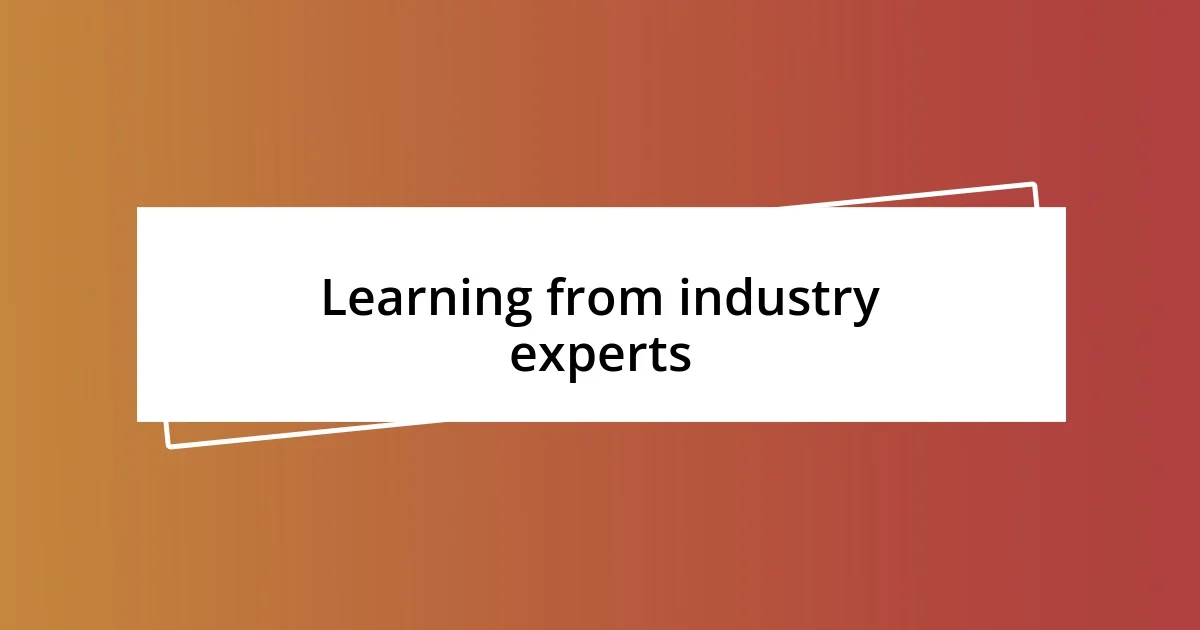
Learning from industry experts
Learning from industry experts became a cornerstone of my crypto security journey. I remember attending a local meetup where seasoned professionals shared their experiences. Listening to their real-life stories—how they overcame security breaches—was eye-opening. It made me realize that reading about cybersecurity is one thing, but hearing about the raw, emotional impact of an incident brings a new level of understanding.
One particular expert spoke about his struggle with a phishing attack. He described the mix of disbelief and anger he felt when he realized he had been duped. His tale made me reflect on my own complacencies. How many times had I brushed aside the warnings against social engineering? The lesson was clear: the threats are real, and I needed to stay vigilant and informed. It highlighted for me that learning from others isn’t just about strategies; it’s also about understanding the palpable effects of inaction.
I’ve also sought out podcasts and webinars, soaking in insights from various experts in the field. There’s something incredibly inspiring about hearing diverse perspectives. It feels like you’re standing on the shoulders of industry giants, gaining wisdom not just from their successes but also from their failures. By engaging with this wealth of knowledge, I’ve become better equipped to make decisions that truly enhance my security posture. Isn’t it fascinating how others’ experiences can shape your own approach?
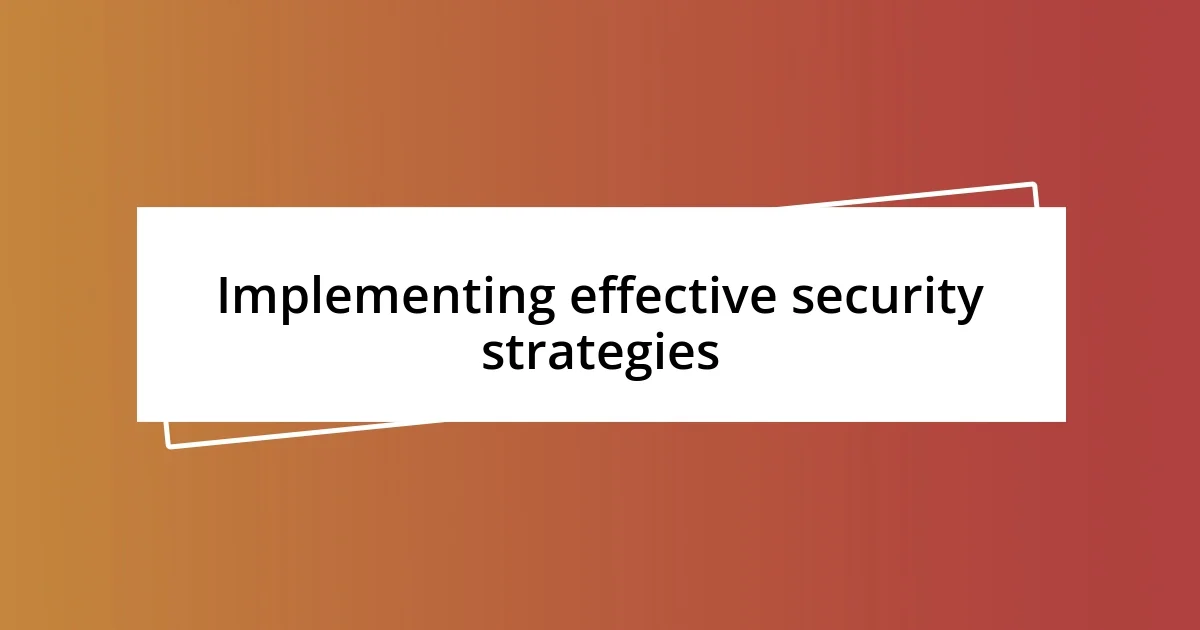
Implementing effective security strategies
Implementing effective security strategies in my crypto journey has been both enlightening and empowering. For instance, I vividly recall the moment I decided to adopt two-factor authentication (2FA) on my accounts. It was a small step, yet it made me feel like I was wrapping my digital assets in a protective layer. Have you ever experienced that sense of security? Simple strategies like this can significantly reduce the risk of unauthorized access, reminding me that even the smallest actions can have a profound impact.
I still remember the anxiety I felt after learning about different types of wallets. Choosing between hot and cold storage felt daunting, but I took the plunge and invested in a hardware wallet after researching extensively. This decision wasn’t just about securing my funds; it was a turning point in my mindset. I understood that it’s vital to have control over my private keys. What better way to protect your assets than keeping them out of reach from potential threats, right? The ownership brought me comfort because I knew I was making proactive choices.
Furthermore, I’ve made it a point to regularly review and update my security practices. Every few months, I analyze potential vulnerabilities in my setup, often asking myself, “Am I still safe?” Last time, I noticed that some of my passwords were a bit stale, so I took time to create unique, robust ones using a trusted password manager. This ongoing vigilance turned into a habit, highlighting the importance of adaptability in the ever-evolving field of crypto security. Wouldn’t it be empowering to know that you hold the keys—not just to your wallet, but to your financial freedom?
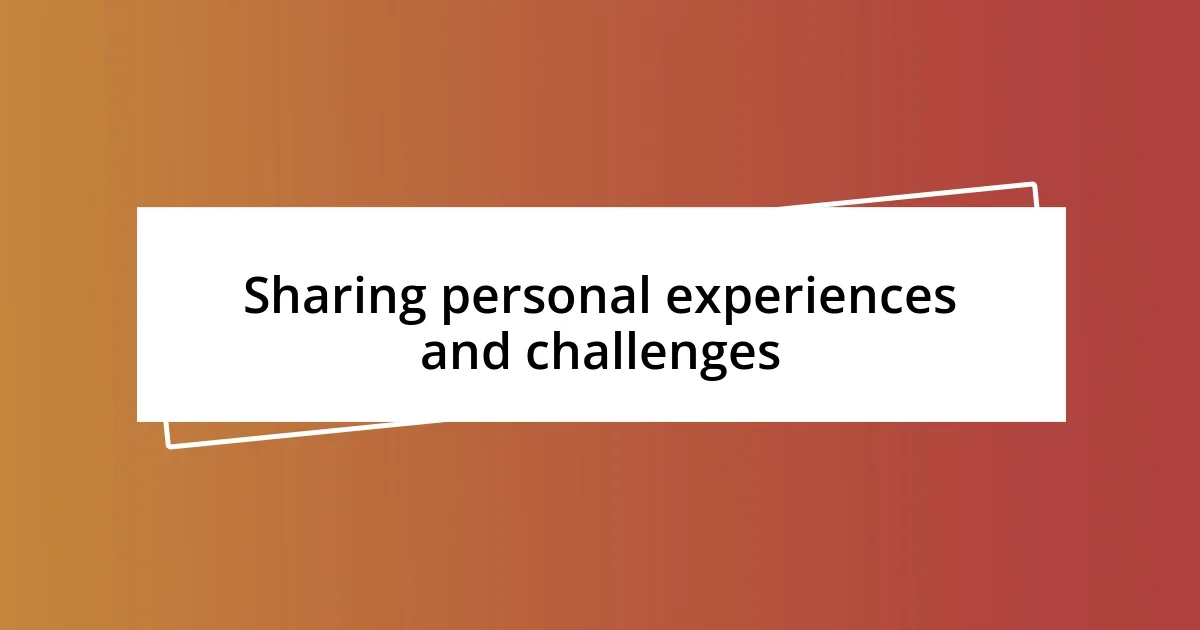
Sharing personal experiences and challenges
One of the biggest challenges I faced early in my crypto security journey was dealing with the fear of losing everything. I still recall the sleepless nights spent worrying after hearing horror stories of major exchanges being hacked. My heart raced each time I logged into my account, and I often wondered: what if this was the day I lost everything I had worked for? It was in those moments of vulnerability that I realized I needed to take control—not just for my assets but also for my peace of mind.
Navigating the intricacies of security software felt like walking through a maze. I vividly remember the frustration I experienced while trying to set up my first VPN. The countless error messages and the sense of being technologically clueless nearly had me throwing in the towel. But then, I thought—wouldn’t it be rewarding to master this? That spark of determination pushed me through the confusion. I eventually succeeded, and mastering that tool felt empowering; I found a sense of accomplishment in overcoming a challenge that initially felt insurmountable.
Another hurdle was connecting with the crypto community. I initially hesitated to share my own experiences for fear of sounding inexperienced or naïve. Yet, one night during a small online gathering, I decided to open up about a security scare I had. To my surprise, the response was overwhelmingly supportive. Others shared their similar worries, and I felt a sense of belonging. Isn’t it incredible how vulnerability can foster connection? This newfound camaraderie reminded me that we’re all in this together, learning and growing from our experiences.
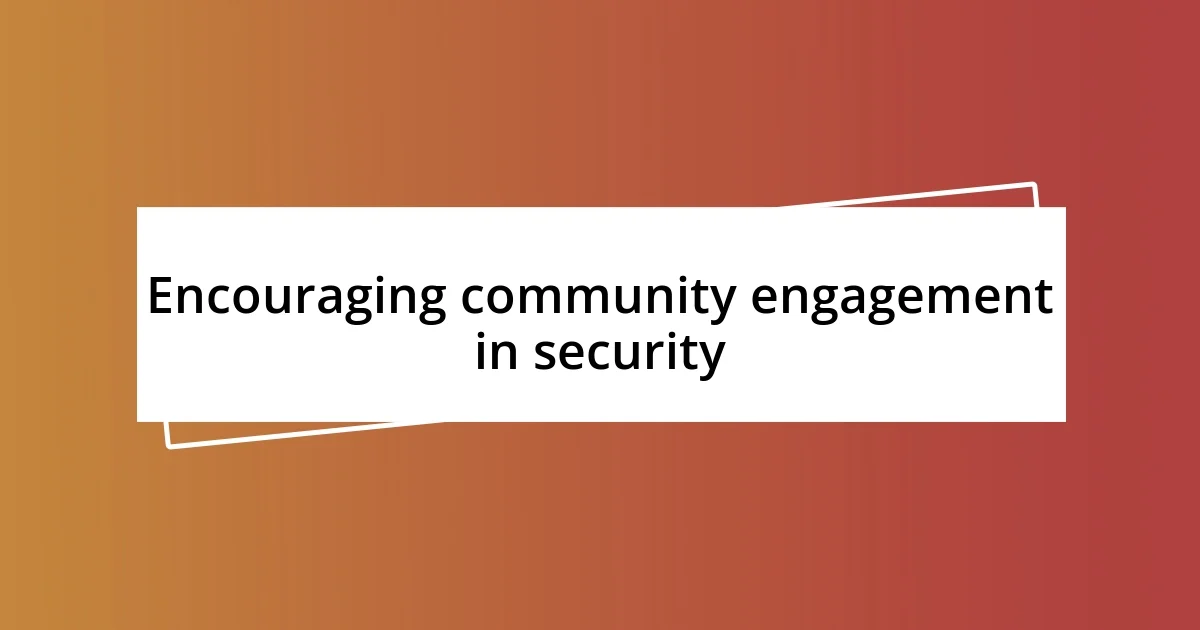
Encouraging community engagement in security
In my journey to enhance security, I discovered the remarkable power of community engagement. When I first joined a local meet-up group focused on blockchain, I felt a surge of enthusiasm. Sharing knowledge and concerns with like-minded individuals opened my eyes to new perspectives. Have you ever found that community support can light a fire in you? I certainly did—what started as casual conversations evolved into invaluable discussions where we exchanged tips and best practices, reinforcing the idea that we’re stronger together.
I remember a particular forum I joined where users took turns sharing their security wins and fails. Hearing how someone mitigated a phishing attack hit home for me; it was a reminder that even the most cautious among us can slip up. It sparked a thoughtful dialogue on what we could learn from each other’s experiences, fostering an environment of empathy and growth. Isn’t it fascinating how collective wisdom can be a catalyst for improvement? Engaging with others not only increased my own awareness but also nurtured a culture of security engagement.
One evening, I facilitated a small workshop for newcomers, focusing on common security pitfalls and preventive measures. As I shared stories and solutions, I could see the transformation in their expressions—from confusion to understanding. I was surprised by the energy in that room, with questions fired my way and group brainstorming taking shape. This experience reinforced my belief that community engagement isn’t just encouraging; it’s essential for cultivating a proactive security mindset. Wouldn’t you agree that the exchange of knowledge across a community can protect us all?


